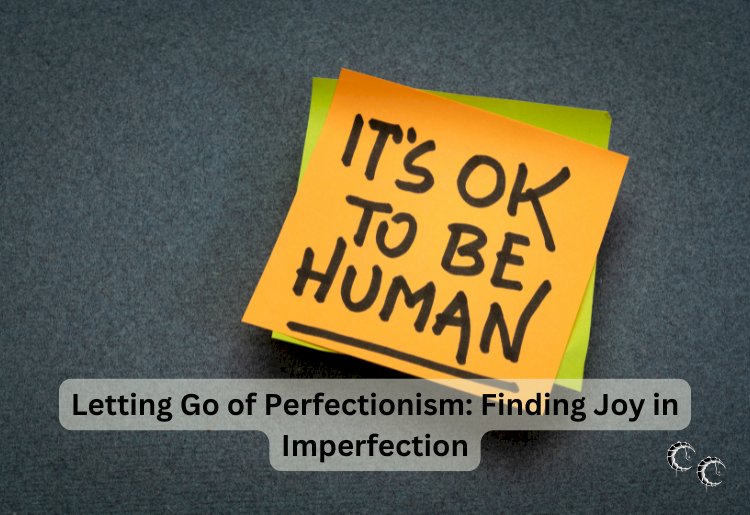Letting Go of Perfectionism: Finding Joy in Imperfection

Perfectionism can be a double-edged sword. On one hand, the desire to do things well can push us to excel and achieve great things. On the other hand, the pursuit of perfection often leads to stress, self-doubt, and the constant feeling of never being “good enough.” While it’s tempting to think that perfection is the key to success and happiness, the truth is that it can hold us back. Letting go of perfectionism and embracing imperfection can open the door to greater fulfillment, creativity, and personal growth.
The Paradox of Perfectionism
Perfectionism is often rooted in a fear of failure or rejection. We believe that if we do everything perfectly, we’ll avoid criticism and gain approval. However, the reality is that perfection is subjective and can vary depending on the situation, audience, or individual perspective. No matter how hard we try, perfection is elusive, and the pressure to achieve it can create unnecessary stress and anxiety.
Additionally, perfectionism can prevent us from taking risks or trying new things. If we’re constantly worried about making mistakes or falling short of our own expectations, we might avoid challenges altogether. This mindset of “all or nothing” can keep us from experiencing the joys of progress and personal growth. It’s only through imperfection and learning from our mistakes that we truly evolve.
The Cost of Perfectionism
Striving for perfection comes with its own set of consequences. Here are some of the ways perfectionism can hold us back:
-
Increased stress and anxiety: The constant pressure to perform at the highest level can lead to burnout and feelings of overwhelm. When we’re never satisfied with our work, it becomes harder to relax and appreciate our efforts.
-
Fear of failure: Perfectionism is closely tied to a fear of failure. When failure is viewed as unacceptable, it can cause us to avoid trying new things, leaving us stuck in our comfort zone. We miss out on valuable opportunities for growth and learning.
-
Procrastination: The desire to do something perfectly often leads to delays. If we feel like we don’t have the resources, time, or ability to achieve perfection, we may put off tasks altogether, avoiding them until everything feels “just right” (which may never come).
-
Self-criticism: Perfectionists tend to be overly critical of themselves. Instead of celebrating achievements, they focus on flaws and shortcomings. This self-criticism can lead to a negative self-image and prevent us from appreciating our accomplishments.
Embracing Progress Over Perfection
The key to letting go of perfectionism is shifting our focus from perfection to progress. Instead of fixating on an ideal outcome, we can embrace the journey and appreciate the small steps we take toward improvement. Here’s how you can start embracing imperfection:
-
Focus on learning, not just results: Perfectionism often equates success with the final result. But true growth comes from the process of learning. Embrace mistakes as opportunities for improvement. When you make a mistake, ask yourself, “What can I learn from this?” instead of dwelling on the failure.
-
Celebrate small wins: Rather than waiting for the end result to feel satisfied, celebrate the small victories along the way. Each step forward, no matter how small, is progress. By focusing on incremental growth, you’ll develop a sense of accomplishment and satisfaction throughout the journey.
-
Set realistic goals: While it’s great to aim high, setting unrealistic expectations can lead to frustration. Set achievable goals that challenge you without overwhelming you. Break larger tasks into manageable pieces, and focus on completing one step at a time.
-
Practice self-compassion: Be kind to yourself when things don’t go as planned. Everyone makes mistakes—it’s a natural part of life. Treat yourself with the same compassion and understanding that you would offer a friend. Remind yourself that you don’t need to be perfect to be valuable or worthy of love and success.
-
Let go of comparison: It’s easy to compare yourself to others, especially in a world where social media often highlights the “best” versions of people’s lives. Remember that you’re seeing only the polished, curated side of others. Everyone has their own struggles, and no one is perfect. Focus on your own growth, and trust that everyone’s journey is unique.
Finding Joy in Imperfection
When you let go of the need for perfection, you open yourself up to a deeper sense of fulfillment and joy. Imperfection allows you to experience life more fully, to connect with others authentically, and to appreciate the beauty in the messy, imperfect aspects of the world.
By embracing progress over perfection, you can:
-
Cultivate creativity: Imperfection allows you to take risks, explore new ideas, and experiment without fear of judgment. It’s often when we let go of rigid expectations that we create our most innovative work.
-
Build resilience: Facing challenges and setbacks without the pressure to be perfect helps you build emotional resilience. You learn to adapt, persevere, and bounce back from adversity.
-
Create deeper connections: When you accept your own imperfections, you’re more likely to embrace the imperfections in others. This fosters stronger, more authentic relationships and allows you to connect with people on a deeper level.
Conclusion
Perfectionism can be paralyzing, preventing us from fully experiencing life and reaching our true potential. By shifting our mindset from perfection to progress, we free ourselves from the constant pressure to perform at an unattainable standard. Embracing imperfection leads to greater joy, creativity, and self-compassion. Remember, life isn’t about being perfect—it’s about growing, learning, and enjoying the process.






























